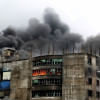ILO emphasises extending occupational safety in informal sector as well

Bangladesh has made progress in improving occupational safety and health (OSH) in the readymade garment sector, but there are challenges in extending the framework in other sectors like the informal economy, said the International Labour Organization (ILO).
In Bangladesh, OSH is primarily regulated by the Bangladesh Labour Act. The government also developed a National Occupational Safety and Health Policy 2013, and the Domestic Workers Protection and Welfare Policy 2015 to promote health, safety, and dignity in the world of work.
While there are provisions for protection of workers against violence and harassment, still the emphasis is more on workplace safety.
"Bangladesh can leverage and expand the scope of its OSH frameworks to also address violence and harassment at the workplace," said Tuomo Poutiainen, ILO's country director for Bangladesh, in a report titled "Practical guidance and tools to prevent and address violence and harassment in the world of work: An OSH perspective."
The report highlighted whether the general duty of care for workers' health provided for by OSH legislation is sufficient to prevent violence and harassment.
It lauds the Supreme Court of Bangladesh's critical role in the prevention and elimination of sexual harassment, resulting in changes in the labour law.
In 2009, the High Court Division of the apex court issued directives in the form of guidelines on sexual harassment for all workplaces and educational institutions in both public and private sectors.
The report is jointly funded by the European Commission and the ILO.

 For all latest news, follow The Daily Star's Google News channel.
For all latest news, follow The Daily Star's Google News channel. 







Comments